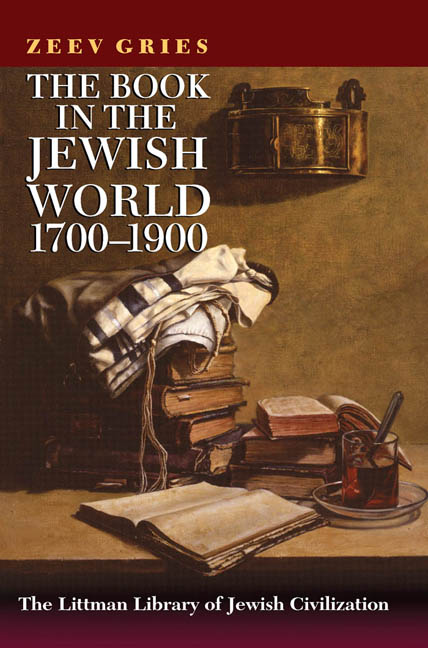Book contents
- Frontmatter
- Dedication
- Preface to the English Edition
- Contents
- List of Illustrations
- Note on Bibliographical Conventions and Transliteration
- Introduction
- PART I THE AWAKENING OF THE NASCENT INTELLIGENTSIA
- PART II THE BOOK: GUARDIAN OF THE SACRED OR HERALD OF SECULARIZATION?
- 8 The New Hebrew Literature: Continuity or Revolution?
- 9 Jewish Books and their Authors in the Nineteenth Century
- 10 Book Reviews in the Hebrew Press
- 11 The Bibliographer and Librarian as an Agent of Culture: The Contribution of Abraham Ya'ari to the Study of Jewish Publishing in Eastern Europe
- Afterword: The Revolution in the World of Hebrew Books at the Start of the Twentieth Century
- Appendix: The Young Abraham Ya'ari
- Bibliography
- Index of Books and Periodicals
- Index of Places
- Index of People
- Index of Subjects
8 - The New Hebrew Literature: Continuity or Revolution?
from PART II - THE BOOK: GUARDIAN OF THE SACRED OR HERALD OF SECULARIZATION?
- Frontmatter
- Dedication
- Preface to the English Edition
- Contents
- List of Illustrations
- Note on Bibliographical Conventions and Transliteration
- Introduction
- PART I THE AWAKENING OF THE NASCENT INTELLIGENTSIA
- PART II THE BOOK: GUARDIAN OF THE SACRED OR HERALD OF SECULARIZATION?
- 8 The New Hebrew Literature: Continuity or Revolution?
- 9 Jewish Books and their Authors in the Nineteenth Century
- 10 Book Reviews in the Hebrew Press
- 11 The Bibliographer and Librarian as an Agent of Culture: The Contribution of Abraham Ya'ari to the Study of Jewish Publishing in Eastern Europe
- Afterword: The Revolution in the World of Hebrew Books at the Start of the Twentieth Century
- Appendix: The Young Abraham Ya'ari
- Bibliography
- Index of Books and Periodicals
- Index of Places
- Index of People
- Index of Subjects
Summary
IN THE AUTUMN OF 1979, when my wife and I were in England, we took the opportunity to visit the spiritual community of Findhorn. This settlement is located in a region of northern Scotland noted for its fierce storms; yet the community, which follows a unique way of life, had succeeded in cultivating the land in an area where everyone else had given up. As a son of farmers who had failed in his efforts to make agriculture his profession and source of livelihood, I had been attracted for some time by the fabled achievements of this community. The story of the great harvests of Findhorn appeared in brochures and leaflets which were circulated worldwide.According to the reports, the members of the community had worked wonders, growing cabbages the size of pumpkins and squash the size of melons on its barren soil. This miracle was said to be less a blessing from heaven than a direct result of meditation—combined with music specially composed for the process of personal, inner concentration—practised in the fields, especially at night.When we reached Findhorn, I found to my astonishment that the fields were miserable. The ‘gigantic’ vegetables were closer in size to lemons than the massive specimens promised in the literature. On the other hand, to my surprise, the community's publishing house, from which material flowed in profusion, was impressive in both its size and its activity.
Relying on current accounts without examining in detail the craggy soil on which modern Hebrew literature grew in the second half of the nineteenth century, it might appear that it flourished in a manner similar to that of the vegetables described in Findhorn's brochures: a harvest that provided the Jews of the period with their spiritual nourishment. I would contend, however, that here too there is a huge discrepancy between the true situation and the way in which it has been interpreted. Scholars claim that the impact of the Haskalah and secular literature, particularly during the second half of the nineteenth century,was such as to start a revolution in reading habits whose impact is felt to this day.
- Type
- Chapter
- Information
- The Book in the Jewish World, 1700–1900 , pp. 103 - 112Publisher: Liverpool University PressPrint publication year: 2007

